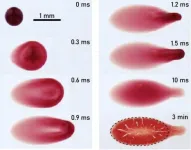(Press-News.org) Female academics are significantly underrepresented in winning academic prizes and having awards named after them, a new study shows.
Analysis of nearly 9,000 awardees and 346 scientific prizes and medals published today (Tuesday 21 November) in Nature Human Behaviour has found that men win eight prizes for every one won by a woman if the award is named after a man. These awards represent almost two thirds of all scientific prizes.
Female academics are however more likely to win awards that have been named after other notable female scientists, with 47% of those awards going to women and 53% to men.
Dr Katja Gehmlich, Associate Professor in the Institute of Cardiovascular Science at the University of Birmingham and joint lead author of the study said:
“The gender gap between awardees in scientific prizes is sadly a product of a long, systematic issue of poor representation of women in sciences. Despite decades of efforts to rebalance this issue, our study shows that women are still poorly recognised for their scientific contributions and men are far more likely to win prizes and awards in particular if those awards are names after other men.
“It seems particularly shocking to me that awards named after women still see more than half of prizes going to men, because of how significantly skewed the data is for male-named awards where men have won 88% of them.
“We further propose a list of actions to address and overcome these issues but are aware this will be a long process. The Nominate Her movement is one way that the scientific community can begin to address this.”
Prof Stefan Krause from the School of Geography, Earth and Environmental Sciences at the University of Birmingham and joint lead author of the study said:
“Our data is indicative of much wider issues of gender inequality within sciences. Our current publication is an initial attempt to understand the causes of such striking gender inequality and to promote discussion on the subject within our scientific communities.
“Research culture has a lot to do to improve the gender prize gap that we see perpetuating to this day, as well as efforts to address the disparity that sees almost two thirds of prizes currently named after men. More radical pathways may also be needed such as renaming or getting rid of gender names associated with some awards.”
END
Gender prize gap in science exists as only one in eight female academics win awards named after men
2023-11-21
ELSE PRESS RELEASES FROM THIS DATE:
Effect of aerosol particles on clouds and the climate captured better
2023-11-21
Leipzig/Mainz. The extent to which aerosol particles affect the climate depends on how much water the particles can hold in the atmosphere. The capacity to hold water is referred to as hygroscopicity (K) and, in turn, depends on further factors – particularly the size and chemical composition of the particles, which can be extremely variable and complex. Through extensive investigations, an international research team under the leadership of the Max Planck Institute for Chemistry (MPIC) and the Leibniz Institute for Tropospheric Research ...
Hydrogen detected in lunar samples, points to resource availability for space exploration
2023-11-21
WASHINGTON – U.S. Naval Research Laboratory (NRL) researchers have discovered solar-wind hydrogen in lunar samples, which indicates that water on the surface of the Moon may provide a vital resource for future lunar bases and longer-range space exploration. Space-based resource identification is a key factor in planning for civilian- and government-led space exploration.
“Hydrogen has the potential to be a resource that can be used directly on the lunar surface when there are more regular or permanent ...
How gut microbes help alleviate constipation
2023-11-21
Scientists have identified the genes in the probiotic Bifidobacteria longum responsible for improving gut motility. A research team reporting November 21st in the journal Cell Host & Microbe found that B. longum strains possessing the abfA cluster of genes can ameliorate constipation through enhanced utilization of an indigestible fiber called arabinan in the gut.
“We established the causal link between a genetic variant—the abfA cluster—to the key functional difference of probiotic B. longum in multiple model organisms, including mice and humans, and provided mechanistic and ecological insights ...
Written in blood
2023-11-21
WASHINGTON, Nov. 21, 2023 – Forensic science has captured the public imagination by storm, as the profusion of “true crime” media in the last decade or so suggests. By now, most of us know that evidence left at a crime scene, such as blood, can often reveal information that is key to investigating and understanding the circumstances around a crime — and that scientific methods can help interpret that information.
In Physics of Fluids, by AIP Publishing, a group of scientists from Boston University and the University of Utah demonstrated ...
Unstable housing and mortality among veterans receiving dialysis
2023-11-21
About The Study: In this study of 25,000 veterans receiving dialysis, unstable housing experienced before starting dialysis was associated with increased risk of all-cause mortality, and risks increased with age. Further efforts are needed to understand the experiences of older adults with unstable housing and to estimate the scope of unstable housing among all individuals receiving dialysis.
Authors: Tessa K. Novick, M.D., M.S.W., M.H.S., of the University of Texas at Austin Dell Medical School in Austin, Texas is the corresponding author.
To access the embargoed study: Visit ...
Food insecurity, memory, and dementia among adults age 50 and older
2023-11-21
About The Study: In this study of 7,000 older U.S. residents, food insecurity was associated with increased dementia risk, poorer memory function, and faster memory decline. Future studies are needed to examine whether addressing food insecurity may benefit brain health.
Authors: Aayush Khadka, Ph.D., of the University of California, San Francisco, is the corresponding author.
To access the embargoed study: Visit our For The Media website at this link https://media.jamanetwork.com/
(doi: 10.1001/jamanetworkopen.2023.44186)
Editor’s ...
Study highlights need to keep an eye on the ozone hole
2023-11-21
Despite public perception, the Antarctic ozone hole has been remarkably massive and long-lived over the past four years, University of Otago researchers believe chlorofluorocarbons (CFCs) aren’t the only things to blame.
In a study, just published in Nature Communications, the group analysed the monthly and daily ozone changes, at different altitudes and latitudes within the Antarctic ozone hole, from 2004 to 2022.
Lead author Hannah Kessenich, PhD candidate in the Department of ...
Scientists take a step forward in understanding how to tackle chronic infections in cystic fibrosis patients
2023-11-21
Scientists have engineered a living material resembling human phlegm, which will help them to better understand how a certain kind of infection develops on the lungs of patients with cystic fibrosis.
The study, published in Matter, was led by Dr Yuanhao Wu and is a collaboration between Professor Alvaro Mata in the School of Pharmacy and Department of Chemical Engineering and Professor Miguel Cámara from the National Biofilms Innovation Centre in the School of Life Sciences at the University of Nottingham.
Biofilms are strong living 3D materials that play ...
BU study finds long-term acute care hospital closures associated with changes in hospital care practices
2023-11-21
EMBARGOED by JAMA Network Open until 11 am, ET, Nov. 21, 2023
Contact: Gina DiGravio, 617-358-7838, ginad@bu.edu
BU Study Finds Long-term Acute Care Hospital Closures Associated with Changes in Hospital Care Practices
(Boston)—Long-term acute care hospitals (LTCHs) are common sites of post-acute care for patients recovering from severe respiratory failure requiring long-term mechanical ventilation. Because of longer lengths of stay compared to regular, short-stay hospitals, the Centers for Medicare and Medicaid (CMS) reimburses LTCHs at higher rates. However, since 2005, ...
How do we learn? Neuroscientists pinpoint how memories are likely to be stored in the brain
2023-11-21
What is the mechanism that allows our brains to incorporate new information about the world, and form memories? New work by a team of neuroscientists led by Dr Tomás Ryan from Trinity College Dublin shows that learning occurs through the continuous formation of new connectivity patterns between specific engram cells in different regions of the brain.
Whether on purpose, incidentally, or simply by accident, we are constantly learning and so our brains are constantly changing. When we navigate the world, interact with each other, or consume media content, our brain is grasping ...



